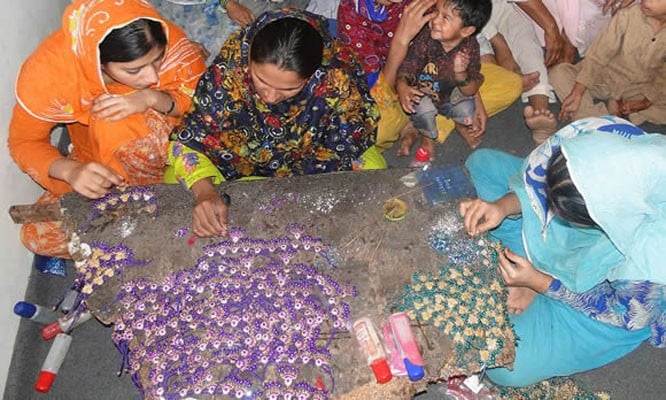
Jameela earns Rs75 to Rs100 for filling every 1,000 bags

Jameela Bibi, a mother of four in her early 40s, is a hardworking woman based in Lahore. She takes care of her family, does household chores and is also a home-based worker. Her sleep is limited to just a few hours. She is just one of the many home-based workers who are living from hand to mouth despite putting in long hours of work. The money offered to them for their work is meagre. Being informal workers they are unable to even claim the minimum wages announced by the Punjab government.
Her wages are calculated on the basis of the quantity or volume of work she produces. No official contract is offered to her and she has to agree to the terms dictated by the middleman who approaches her for work. As a result she has to engage her family members as more hands mean more work and more income.
On any particular day, she can be seen sitting with her daughters on the floor of a small room in her house in a slum-like locality on Bund Road. There is some product lying at the centre of the room and small plastic bags in front of them. They pick the product, weigh it on an electronic weighing scale and place it in the plastic bags one by one. Their hands are working like machines and they are so adept at their work that they can open the plastic bags and place this stuff there without even looking at them.
Jameela stays in touch with potential clients who place orders for packing certain products. There are different orders during different times of the year and the products she has to pack range from sweets to dry fruit, including peanuts, pistachio, cashew nuts, etc, to roasted grams, spices, grains, and so on. She is also required to place the tags of the retailers, whole-sellers or mega superstores on these bags and staple them.
Jameela earns Rs75 to Rs100 for filling every 1,000 bags. The rate depends on the client and the time of the year. When a festival like eid or Ramzan approaches, the demand for packed food products rises and so Jameela can bargain over the rates. The packing material and the product is provided by the owner.
"Sometimes we work for 16 hours a day but at the end we get a few hundred rupees. Excessive work without rest gives us backache. Our eyesight also suffers because we work in dim light and even when there is no power supply," she says.
Also read: A daily affair
Jameela’s husband does menial jobs but not on a regular basis. The burden of running the house is, therefore, on her shoulders. It is discouraging that the state is a silent spectator and there is no one who can stop her exploitation. She is not aware of terms like minimum wage, social security, emergency medical help, a comfortable workplace environment and so on.